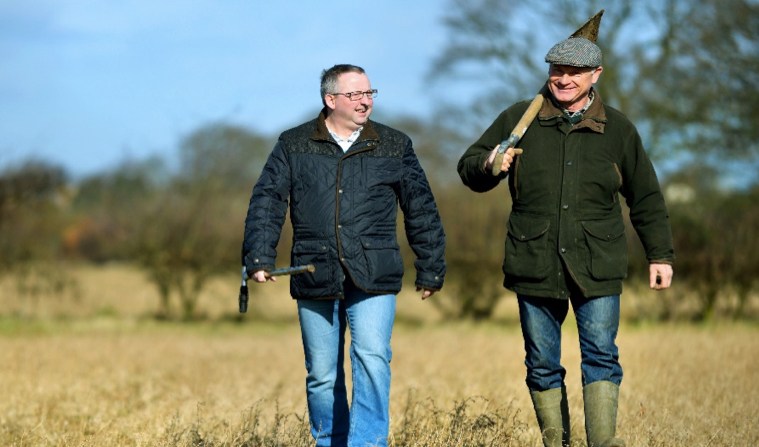
Farmers and landowners across the UK now have a chance to unlock extra income thanks to a fresh approach to carbon trading.
AR Carbon aims to improve soil fertility naturally and in doing so increase the amount of carbon stored (known as ‘sequestered’) in that soil.
This carbon can then be ‘sold’ to big businesses wishing to offset their own emissions – with 50 hectares of land typically generating an extra income of around £4,000 a year.
Traditionally individuals or companies have looked to balance their carbon footprint by investing in renewable energy, the cleaner burning of fossil fuels or planting trees.
But AR Carbon’s managing director Richard Page – who previously worked for former F1 world champion turned organic farming expert Jody Scheckter – hopes to provide farms, sports facilities and landowners with a sustainable and long term source of supplementary income.
He has already tested his approach on 30 trial sites across the UK and is confident that those who sign up will see the benefits.
Farmers who enter the scheme will have their soils tested to provide a baseline measurement of carbon content and will then be supported to increase this figure, with further tests done annually.
The process involves a range of land management techniques, such as no-till, cover crops and the use of non-synthetic fertilisers.
Those who have already been actively doing this, such as organic farmers, may be able to be paid for the work they have already done in capturing carbon, so long as they have kept verifiable measure-ments along the way.
Mr Page said: “It’s not about converting farms to wholly organic practices – we know we have to be practical. It’s about getting the balance right.
“But in time, this more natural approach will increase the amount of organic matter in the soil, which helps capture more carbon.
“We’ll then trade that carbon with larger companies that need to offset it against their own emissions, for example, through heating their headquarters or fueling a fleet of delivery vehicles.”
On a 50 hectare farm this could generate an extra £4,000 a year.
Mr Page, who previously worked in the fertiliser industry and has a keen interest in organics, said: “By working to increase the level of carbon in their soil, and getting paid to do so, farmers can gain a valuable new income.
“Typically there will only be a 1% increase in organic matter over a 10 year period, but the financial results are worthwhile. You’re looking at a return of £4,000 a year for every 50 hectares.
“It’s realistic to think the farmer or landowner will receive 30-40 years of potential income so it creates real sustainability for the long term future of the business.”
Mr Page said increasing levels of organic matter creates a healthier soil, thereby reducing farmers or landowners’ reliance on artificial fertilisers – improving yields and helping to cut costs to create a more profitable production regime.
“A more natural approach has an edge because it can replicate what’s already in the soil and multi-ply it – getting it to work to your advantage,” he said.
“Crops will naturally grow better because there are more nutrients. It therefore means less money spent on chemicals, while it should also cut down vehicle movements - creating further savings in terms of fuel costs and wear and tear to tractors and other machinery.”
Arable farmer Simon Cowell is one of the first to sign up to AR Carbon’s service, having gradually increased the level of carbon in his soil for a little over 10 years.
At the 400 acre Motts Farm, in St Lawrence, Southminster, Essex, he practices a no-tilling approach, with reduced fertiliser applications, growing a variety of crops that include winter wheat, winter barley, lucerne (alfalfa), beans, linseed, peas and rye grass for seeds on a six year rotation.
Over the course of the last 12 years this has increased the organic matter in his soil from an average of 4.2% to 5.3%.
The rise would have been enough to generate an extra £12,000 of income a year for his business – had he sold the available sequestered carbon.
Yields have remained consistent and the amount spent on fertiliser has reduced – ensuring net profits are also higher.
However he still controls blackgrass with limited applications of herbicide, proving a gradual conversion from a conventional system is both possible and profitable.
Mr Cowell said: “Leaving the soil undisturbed is the key. Any form of cultivation means that you lose organic matter, which in turn reduces the amount of carbon in the soil. By simply leaving it alone I’ve increased that level and it’s created a healthier soil. As a result I’ve been able to stop using phosphorous, lime and potash because everything I need is being made available naturally.”
Mr Cowell said less cultivation has also meant being able to use smaller tractors which are doing far less hours – saving money on diesel and general wear and tear. It also has further environmental advantages as it leaves top soil undisturbed, ensuring nutrients are not leached into nearby ditches and rivers.
He added: “The whole approach makes for a more reliable farming system. To then be able to ‘sell’ the extra carbon I’ve created makes perfect sense. It’s a great way to achieve a long term sustainable income and is potentially something that all farmers can benefit from.”
